Min was drawn to the ACAM program because they were seeking community. They finally took their first ACAM course in their fourth year and facilitated a student directed seminar on mental wellbeing of the Asian-Canadian diaspora in their fifth year. The people that they’ve met through ACAM are the brightest, most passionate, creative visionaries. They found community and continue to create community through their involvement with this program. They are pursuing a Bachelor of Social Work degree starting in the fall. They’re excited to pursue creative social justice projects centering stories of the diaspora and to weave our lived experience into all the things that they share with the world.
Audrey Chan (BA, Asian Area Studies)
Audrey is a second generation Chinese American born and raised on unceded Kumeyaay land (San Diego, California). She is graduating with a BA in Asian Area Studies and a minor in Asian Canadian and Asian Migration studies. Audrey aims to further utilize the knowledge obtained from ACAM in order to strengthen her own understanding of what “Asianness” and “Asian American” means to her. This summer, Audrey looks forward to basking in the southern California sun with her dog, eating copious amounts of salmon sashimi and tacos, and finally getting around to her overdue list of Goodread books.
Why were you drawn to the ACAM program?
Entering into the ACAM program was a serendipitous occurrence that began with me reading the course code incorrectly. However, I was quickly drawn in by the program’s wide range of courses/themes and the welcoming environment provided by both faculty and students alike. ACAM also provided a safe space that encouraged us to draw on our own personal experiences and to continue our dialogue both in and outside the classroom. Declaring ACAM as my minor also served as an extension to my Asian Areas Studies major; however, I felt that my department (Asian Studies) was largely East Asian centric. The expansiveness of ACAM’s interdisciplinary courses provided a more fulfilling and three dimensional academic experience.
How has ACAM impacted you or the people around you?
Growing up in a predominantly white neighborhood and being one of the few Asian students throughout my school years, I really struggled to come to terms with my Asian American identity. ACAM provided an outlet for me to unpack some of my racial trauma and internalized racism as well as the language to discuss the feelings and thoughts that I often struggled to articulate. I especially want to thank Dr. Danielle Wong (ENGL 371 and ACAM 320D) for constantly pushing and challenging my intellectual boundaries while also making me feel “seen”, both in terms of my personhood and academic work.
What is one piece of advice you would give to your first year self?
What you have to say is worth listening to, so take pride and ownership in the work you produce.
Athena Chen (BA, English)
Athena is graduating with a major in English Literature and a minor in ACAM. She wants to thank the ACAM program for opening her eyes in seeing the value of local marginalized histories and providing a sense of belonging and pride in her cultural identity. Every ACAM class has taught her to keep questioning, discovering, and to showcase alternative narratives of history, and the importance of including diverse cultural references in students’ learning. She will be attending UBC’s Bachelor of Education Program this September, where she will be applying the valuable knowledge gained through ACAM and prepare to pass it on to her future students. As ACAM has helped shape her own cultural identity, she also aims to provide her students a sense of belonging and pride in building their unique sense of self and cultural identity.
Why were you drawn to the ACAM program?
I discovered ACAM through taking ENGL 371 with Dr. Chris Lee, and although I originally had a history minor which I was close to finishing, I immediately changed my minor within the first three weeks of class to ACAM. I was hooked by the discussions of Asian minority communities in Vancouver, and reading material we had in class, most notably Disappearing Moon Cafe by Sky Lee. Growing up in Richmond B.C. I was surrounded by a prominent Asian community, however in school we were only taught a limited history of Asian migrants to British Columbia, reduced to only one Social Studies class about the Chinese migrant railroad workers. It was invigorating to explore more about the history of Chinese Canadians beyond the narrow scope of migrant workers, as ACAM first revealed to me the deep generational roots of people who looked like me in the city I was born in.
How has ACAM impacted you or the people around you?
ACAM has given me a sense of belonging in my cultural identity. Even as a part of the Asian majority in Richmond, I’ve always battled with my confidence in my Asian identity. Throughout grade school I convinced myself being “white-washed” was what set me apart from the stereotypes Chinese people face in Vancouver. Largely, this had to do with having little to none Asian role models or references in the media and in the course material in school. ACAM was like a new world parallel to the one I lived in, stepping away from a Euro-centric view on local history. I was in awe of discovering a rich and diverse Asian history in Vancouver, such as how different waves of immigration from different countries reflect historic global events, and to the strong connections between different minority communities on a local scale. ACAM has changed my own pride in my cultural identity and the way I value marginalized local histories through different cultural and gendered lenses.
What are you most looking forward to in the future?
I am looking forward to providing the next generation with the tools to appreciate and recognize the value of local history among marginalized communities. I have just been accepted into UBC’s Bachelor of Education Program, and I wish to apply what I’ve learned from my experience in ACAM to my teachings for my future students. From my experiences growing up in a high school where the racial minorities were the majority, it doesn’t make sense to me to teach such a limited, Euro-centric, two-dimensional Canadian history to a classroom full of diverse students, especially in a province literally built on immigrants. I would like to modify school curriculums to include more diverse literature and histories in its liberal arts courses. I aim to showcase the value of different histories, apart from the textbook history used in the same class for decades. But overall, I will provide a wide range of stories and references in my teachings so students of all cultures, genders, and sexualities can have some sense of belonging in the materials they are using to enrich their knowledge, and in turn, take pride in building their unique sense of self.
Winnie Ha (BA, History)
Winnie Ha is a history major and ACAM minor from Elk Grove, California, and transferred to UBC from Cosumnes River College in Sacramento in 2020. While she was at UBC, she played clarinet for the Thunderbird Marching Band, wrote for the sports section of the Ubyssey, was a part of Dance Horizons, and was involved with the Alpha Phi Omega national service fraternity. Outside of school, she volunteered as a mentor for Learning Buddies Vancouver in spring 2021 and as a media intern for the Surrey Eagles Junior A hockey team during the 2021-2022 school year.
Why were you drawn to the ACAM program?
I was drawn to ACAM from the day I found out that the program existed at UBC (before I even started college), probably in part because I’m Chinese American and I’ve been interested in Canadian history for as long as I can remember. I decided to make the minor switch after taking HIST 485 with Dr. Yu, partly because I related to these stories that we were talking about, even though I grew up down the coast.
What is your favourite/funniest memory from ACAM?
My favorite memory from ACAM would probably be working on my project for ACAM 390 during summer 2021. We stayed up until late at night on Discord calls trying to figure out how to edit a podcast, and while we went off topic way too many times, we formed such a special bond that we met up several times throughout the past year, even long after the class ended.
How has ACAM impacted you or the people around you?
ACAM has impacted me in more ways than I could try to include in a paragraph. Before coming to UBC, I remember that I was really insecure about my Asian American identity and at some times felt isolated because of it. Learning about other Asian North American experiences has really helped me learn to take pride in my identity and know that I’m not alone, in a way. It’s also taught me that a lot of my negative experiences have been societal and that I shouldn’t necessarily be ashamed of them. I’ll be headed to Minnesota in about a week and will be spending the majority of my next few years somewhere in the eastern half of the United States, but I know that I’ll still carry this pride with me even when I’m a minority again.
ACAM has also given me the opportunity to learn more about my family’s migration background and the contexts of it: my family’s history is quite the mouthful and involves six countries in the past three generations (seven, if you include me being in Canada), and it was kind of cool to learn how American involvement in foreign conflicts (specifically, World War II and the Vietnam War) actually led to my parents (who are both of Chinese descent) meeting in Germany in the 1990s.
What is one piece of advice you would give your first year self?
My advice for my first year self would be to stop trying to impress other people, especially at the expense of yourself. Take the classes that you actually want to take, join the activities that you want to be a part of. Don’t be somebody who you’re not.
What are you most looking forward to in the future?
In my future, I’m looking forward to being a social media intern with an amateur baseball team in Rochester, Minnesota, for the summer, and then heading off to law school in the fall, with the intention of one day becoming a sports attorney! In the future in general, I’m looking forward to a more accepting, understanding, and eco-friendly world.
ACAM 390A students partner with Vancouver’s Punjabi Market Collective to showcase revitalization efforts
Written by Roshni Riar, UBC Community Engagement.
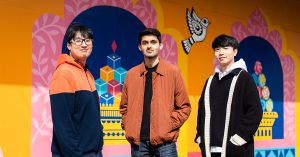
Take your learning beyond the classroom and make a positive impact in a local community this summer. ACAM 390A: The Heritage of Chinese Migrations is a unique, community-focused learning experience that offers thoughtful opportunities to engage and build connections with communities throughout Vancouver and Asia.
“Students should consider taking ACAM 390 if they want a learning experience that breaks the boundaries of traditional education and takes a step further into helping local communities. ACAM 390 is a community-oriented course where your contributions can truly make a difference to the communities you work with.” — Donny Chiu (he/him/his), fourth year History student
Last summer, four ACAM 390A students partnered with the Punjabi Market Collective (PMC) to celebrate and highlight revitalization efforts happening at Vancouver’s Punjabi Market at Main and East 49th. Through that partnership, students created the following video essay, Punjabi Market: Resilient Cultures, Resilient Communities.
In advance of this year’s course, we connected with the students behind the project to learn about their experience working with local community organizers and why students should consider taking ACAM 390A.
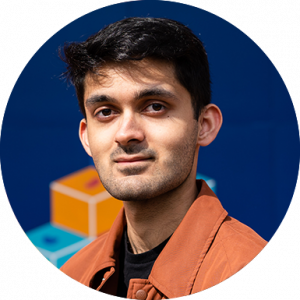 Bharat (he/him/his), fourth-year Geography student
Bharat (he/him/his), fourth-year Geography student
As a child, Bharat visited the Punjabi Market with his family but mostly shopped at Indian markets in Surrey. For him, this project was an opportunity to meet local business owners and appreciate the significance of the Punjabi Market to its community.
Considering ACAM 390 is titled “The Heritage of Chinese Migrations,” what drew you to the Punjabi Market for your final course project?
Our group was excited to focus on the Punjabi Market because it was the first time to be offered as an option in the course. Even though the Punjabi Market may differ from the other Asian heritage spaces highlighted in ACAM 390A, these sites often face similar issues such as gentrification. Since heritage sites do not often communicate with each other, our goal was to begin a conversation towards building a cross-cultural relationship between the Punjabi Market and other East Asian heritage spaces. By working together, we hoped to address shared struggles and create lasting relationships across the different communities.
How did your project support the needs of the community partner?
While planning our video, we worked closely with Jag Nagra, Creative Director, and Gulzar Nanda, President, to include the central initiatives of the Punjabi Market Collective. They explained the needs of the Punjabi Market, highlighting several community initiatives — including the Marigolds in the Market installation and Murals in the Market, done in conjunction with the Vancouver Mural Fest. We wanted to spread awareness about the Punjabi Market’s community initiatives, highlight the stories of its inhabitants, and communicate the importance of this space to its community.
Apply for ACAM 390A this summer
(July 4 to August 19, 2022).
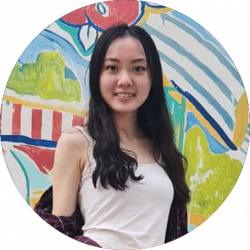
Esther (she/her/hers), recent International Relations graduate
Before enrolling in ACAM390, Esther had never heard of Vancouver’s Punjabi Market. This project allowed Esther to explore a new heritage site and learn about the community that inhabits and keeps the market so lively and personal.
How did you include community voices in your project?
Our video features interviews with Jag Nagra and Gulzar Nanda, who had previously given a lecture about the Punjabi Market in our class. With the permission and guidance of Jag, Gulzar, and community members, our video features scenes of the streets, stores, and outdoor sights around the Punjabi Market. Additionally, Gulzar and Jag shared archival photos of the Punjabi Market which we used to support our story.
“By working with the Punjabi Market Collective, our research proved that there is a plethora of concrete and impactful ways that individuals can connect to thrive in the face of discrimination and racism, and it is this optimism that drives communities to embark on projects to preserve their community spirit.” — Esther Ong
What was your greatest takeaway while working with community partners in the Punjabi Market?
It is easy to be overwhelmed by the waves of online anti-inclusive messages, especially when coupled with everyday microaggressions. Yet, by working with the Punjabi Market Collective, our research proved that there is a plethora of concrete and impactful ways that individuals can connect to thrive in the face of discrimination and racism. It is this optimism that drives communities to embark on projects to preserve their community spirit.
I loved the Punjabi Market’s innovative collaboration with Murals in the Market, which created a space for local artists to showcase their work. It proved to me that the stereotype of grassroots efforts being ‘small-scale’ is anything but that.
Get involved with the Punjabi Market Collective.
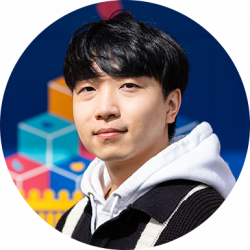 Ky (he/him/his), fourth year Media Studies student
Ky (he/him/his), fourth year Media Studies student
Like Esther, this project was Ky‘s first encounter with the Punjabi Market. The project allowed him to understand the importance of building culturally diverse community spaces. He particularly enjoyed speaking with the community members.
Why should students want to get involved in heritage sites like the Punjabi Market?
Being involved in heritage sites and regenerative efforts allows you to recognize how place-making initiatives play a fundamental role in influencing social inclusion. You realize how much an individual’s dedication matters in community engagement. It was so rewarding to directly experience another culture and contribute to the livability of communities like the Punjabi Market in Vancouver.
How involved was the PMRC in your project? And how did you share the final video with the community?
The PMRC was involved in every process of our project. Gulzar and Jag shared their personal stories and helped us film inside the Himalaya Restaurant and Hi-Class Jewelers, two businesses in the Punjabi Market. After ACAM 390A’s Virtual Community Showcase, we shared our final project video on the PMRC’s social media channels, with the Indian Summer Festival, and on UBC INSTRCC’s social media channels.
Check out Himalaya, HC Jewellers, Murals in the Market, and Dank Mart the next time you visit Punjabi Market on Main Street & 49th.
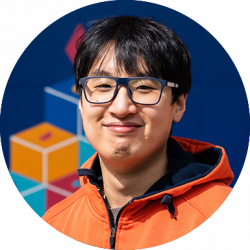 Donny (he/him/his), fourth year History student
Donny (he/him/his), fourth year History student
Prior to the course, Donny wasn’t aware of the Punjabi Market or its revitalization efforts. For Donny, this project was an opportunity to connect with an important Punjabi heritage community and meet new people from diverse communities.
How did community engaged learning add to your UBC experience?
This project was the culmination of everything we had learned in ACAM 390A. It gave my groupmates and I the opportunity to both interpret and synthesize the lessons we learned with our personal experiences to create our video essay — with input from the Punjabi Market Collective.
Likewise, community-engaged learning humanized my lessons in a way I had never experienced before by adding a layer of interaction with the community that we had been learning about.
Why should other students consider taking ACAM 390A?
Other students should consider taking ACAM 390 if they want a learning experience that breaks the boundaries of traditional education and takes a step further into helping local communities. ACAM 390 is a community-oriented course where your contributions can truly make a difference to the communities you work with. As a bonus, ACAM 390A is taught by one of the wittiest and most amiable professors I have ever known (Dr. Henry Yu)!
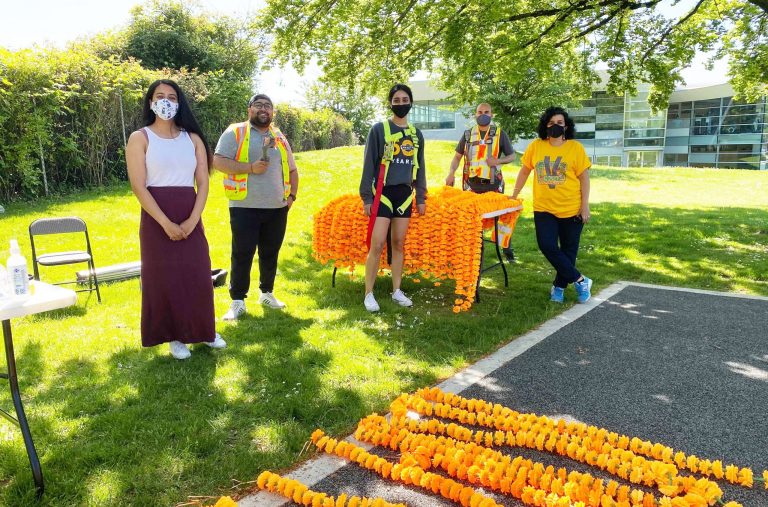
Members of the Punjabi Market Collective preparing for the Marigolds in the Market installation.
Jag Nagra, Creative Director of the Punjabi Market Collective, spoke to the benefits of partnering with students, while highlighting their eagerness to share the market’s history and their revitalization work.
“What I was most impressed with was the fact that they listened to the feedback we provided. They made adjustments to ensure the final product aligned with our goals and the sensitivities to the work we do,” said Jag. “I couldn’t be happier with the result.”
Jag found it refreshing to bring student perspectives to Punjabi Market advocacy. For a long time, this responsibility fell primarily on business owners in the market.
ACAM 390A is a unique course, and if you’re seeking a community-engaged style of learning, it just might be the one for you. Over the span of a few summer months, you can explore new communities, learn from local organizations and heritage initiatives, and make important connections along the way.
Community Organizing: Intergenerational, Intercommunity, & Intersectional Dialogue in Practice
- When: Fri. April 29, 2022 @ 11:00 AM – 12:30 PM (PT)
- Where: Virtual (Zoom link TBA)
- RSVP: See form below (Registration required)

Join the ACAM Dialogues for a panel discussion on “Community Organizing: Intergenerational, Intercommunity, and Intersectional Dialogue in Practice.” This panel features speakers from multiple community organizations across the Lower Mainland. Speakers will reflect on their own experiences with organizing and activism, what they’ve learned along the way, and the challenges and opportunities related to their community work. The event will feature a facilitated discussion with the panellists, followed by a moderated Q&A session.
This is panel will take place virtually, on Zoom. A link to the event will be sent to registrants shortly before the day of.
This event is part of the ACAM Dialogues: Building Anti-Racism on Campus project. For more about the ACAM Dialogues, visit our website.
Speakers: TBA
Schedule of events:
- 11am – 12pm: Facilitated panel discussion
- 12pm – 12:30pm: Moderated Q&A with audience
=========================
*** Accessibility ***
- This event will take place on Zoom, a video conferencing and platform. No Zoom account or app is required to access the event, but participants will need access to a device with a working internet connection and web browser OR a phoning capabilities to join the call via browser or dial-in.
- There are currently no ASL interpreters booked for this event. Automatic live text captioning will be turned on.
- This event requires a working WiFi connection and may not be suitable for those with EMS (electromagnetic sensitivity).
*** Safety & Privacy ***
- This event will not be recorded. Volunteers will be taking notes about overarching themes from the event, but will not share identifying details without consent.
- We ask participants to respect others’ privacy by refraining from recording any part of the event (e.g. via video, screen record, photography, screen captures, etc) unless consent is requested and expressly given.
- The Q&A period will be moderated by facilitators.
* If you have questions or accessibility needs not listed here, please contact acam.events@ubc.ca by Mon. April 25th. *
=========================
ACAM Dialogues — Creative workshop with Jotika Healing Arts
Join us on Tues. March 8 @ 11:30am-1:00pm (PT) for a virtual workshop around mental health in Asian diasporic communities!
We will be welcoming Jotika Chaudhary Samant (she/her) of Jotika Healing Arts. Jotika will be facilitating grounding and centering practices within the framework of anti-oppressive expressive arts therapy. Workshop activities will include guided visual art and writing prompts, to help us process the past year and collectively connect with inner resources such as our imaginations.
No prior artistic or expressive arts therapy experience is required, and participants may use whatever arts and crafts materials they have access to (e.g. pencils, paper, colouring supplies, digital tools such as word processors or multimedia software/websites).
Registration is required due to limited space. Free and open to students who are currently registered in the ACAM program. This event is being organized under the ACAM Dialogues: Building Anti-Racism on Campus project.
About the facilitator:

Jotika (she/her) is a queer woman of colour. She is deeply passionate about the arts as a profound and powerful tool to hold and process trauma and wounds. Expressive Arts Therapy can provide insights into deeper self-awareness of our nervous systems, into our senses. It can support us to remember and reconnect with what safety feels like in our bodies. For more about Jotika or anti-oppressive expressive arts therapy, visit Jotika Healing Arts.
Accessibility:
- This event will take place virtually. Participants will need a device with working Wi-Fi connection and basic arts and crafts supplies for group activities.
- A Zoom link will be shared prior to the event. You do not need to sign up for a Zoom account or download the app to join.
- If you would like to participate but access to arts and crafts supplies is a barrier for you, please email us and we can try to facilitate a supply share.
- Captions will be provided via Zoom’s automatic captioning feature. There are no sign language interpreters booked at this time.
- This event will not be recorded. Event organizers may write notes about overall themes and insights that arise, as part of the workshop outcomes.
If you have any questions, concerns, or requests around this event and/or accessibility, please contact Olivia and amanda at acam.events@ubc.ca as soon as possible, and we will do our best to make additional arrangements.
National Day for Truth and Reconciliation – Wellness Support
Mental Health and Crisis Hotlines
24-hr toll-free crisis line. Serves Indigenous adults and youth in BC.
- Adults/Elders (250-723-4050)
- Child/Youth (250-723-2040)
- Toll free (1-800-588-8717)
- Métis Line (1-833-MétisBC)
24-hr toll free crisis line and online chat. Serves Indigenous people across Canada.
Languages (phone): English, French, Cree, Ojibway, Inuktitut
Indian Residential School Survivor Society
24-hr toll-free crisis line. Serves Indigenous people experiencing pain or distress as a result of their experiences related to residential schools.
Broader Resources
UBC Vancouver Indigenous Portal
Information about resources and networks available to prospective or current Indigenous students, faculty, and staff at UBC Vancouver.
2-Spirit Collective – Urban Native Youth Association
Support, resources, and programming for Indigenous youth, ages 15-30, who identify as Two Spirit/2-Spirit, LGBTQIA+, and those questioning their sexuality or gender. Based in Vancouver.
Dr. Madeline H. Chung (1925-2021)
The faculty, staff, and students of the Asian Canadian and Asian Migration Studies Program are deeply saddened by the passing of Dr. Madeline H. Chung on August 22, 2021. Dr. Chung was the first female Obstetrician and Gynaecologist in BC, and the first of Chinese descent. After arriving in Vancouver in the mid-1950s, a time when Chinese still faced significant racial discrimination, she faced numerous obstacles in her professional and academic career. However, patients flocked to her care, especially Chinese and other immigrant women who could not speak English.
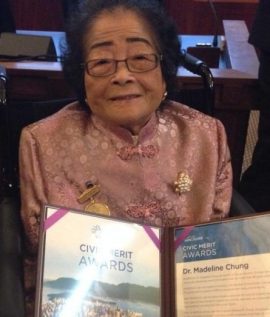
By the time she retired, Dr. Chung had delivered over 7200 babies – known affectionately as “Chung babies” — and her impact on families and communities across BC has been immense. Dr. Chung was a revered community leader who received many awards and honours. Along with her husband, she donated the Wallace B. Chung and Madeline H. Chung Collection, one of the premiere archival collections on Chinese Canadian history, to the UBC Library in 1999.
More information about Dr. Chung’s extraordinary life can be found in this feature article in Vancouver Sun: Dr. Madeline Chung: B.C.’s first female obstetrician’s caring patience for patients.
ACAM would like to extend our sincere condolences to Dr. Chung’s family and friends. She is deeply missed.
ACAM 320D: An Interview with Dr. Danielle Wong
To promote our upcoming course ACAM 320D – Race and New Technology, we interviewed Dr. Danielle Wong who will be teaching it this upcoming fall! Learn more about Danielle and her thoughts behind the course here.
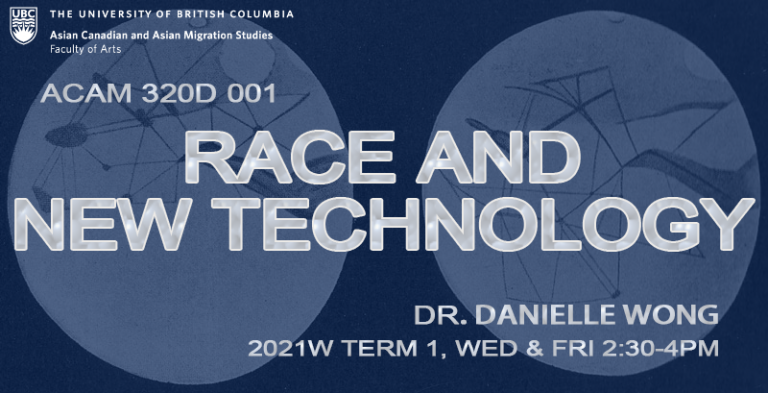
How did you arrive at your current teaching and research interests?
My entrance into research and writing was first through journalism. I was hired as a reporter by a newspaper in Ontario after I graduated from the journalism program at Toronto Metropolitan University (formerly Ryerson University). Because I was the only reporter of colour at the newsroom when they hired me, I ended up being tasked with covering what’s called the “diversity beat.” Even without the language for navigating why I was frustrated with this, I was immediately aware of my limitations and frustrations under that framework of diversity. The way that I was being asked to cover certain stories was either through a celebratory liberal multicultural lens or a very uncritical take that didn’t grapple with the underlying foundational racial violence of the nation-state, settler colonialism, or imperialism. I didn’t have certain tools to work with as a reporter and I really wanted to navigate the complexities of those stories. So I ended up going back to school. I did my MA in the English and Cultural Studies Program at McMaster while I was still working, and eventually just felt like that part of research and writing was more suited for me. I did my PhD, after which I worked as a postdoctoral associate in the Asian American Studies Program at Cornell University. These were all very formative experiences that ultimately led me here right now to UBC and that have also affected the ways I approach the so-called “event.” I am interested in the “event,” which is a very journalistic way of understanding crisis or what is contemporary, but I think about the event–whether we are referring to the local, national, or global–as entrenched in past, present, and future temporalities of Empire.
I would say my intellectual questions around technology were already there, kind of brewing when I worked as a reporter. When I graduated from journalism school, Ryerson still had a print journalism stream. But by the time I got a job at a newspaper, I was basically working as a multimedia journalist. I was asked to navigate and handle the newspaper’s Twitter account and website – I was doing online reporting, some videos, tweeting as journalism. What that experience surfaced for me was the shifting questions around mediums and mediation, so-called “new technologies,” and what it means to use those technologies to produce stories that help us navigate, or don’t help us navigate, power structures. And the question of the self as well–what it means to perform a “self” online. And performance is complex, right? It could be really, in some ways, subversive or mischievious, in ways that question, for instance, surveillance systems or the way our patterns and behaviours online are collected as data. So, I would say that my early experiences as a junior reporter were what prompted me to think about the role of social media and racial performance.
What unique avenues and potentials do courses in ACAM provide students with? What makes it different to teach this course in ACAM?
Teaching in ACAM is really exciting to me because the fields that are encompassed by the banner of ACAM foreground the political conditions and the material histories in which knowledge production happens. And because of the interdisciplinary nature of the program, it’s really special to have students from different disciplines and different programs come together in a classroom where they all bring their own perspectives and expertise about particular objects and topics. For instance, sometimes I assign a novel for a course, and a computer science student will come in and approach the questions that I’m asking about the novel in a way that’s really helpful and generative for an English student. And because ACAM, in its very formation, is an acknowledgment of the political nature of learning and producing knowledge, I find students usually come in ready to have those discussions, and based on that premise, there’s also a reflexive nature in which we are thinking about our contexts and the conditions of our discussion and learning.
What do you hope students will take away from this course?
I hope the students will come away with an expansive idea of the term “technology” as a way to enter into a set of questions. Questions that include: what is the relationship between Asian North Americans or Asian diasporic folks, and capitalism, and in particular, information capitalism? What emerges when we follow transnational or diasporic networks, whether they be analog connections or digital ones? And how can we conceive of the role of Asian labour in producing new media productions, new media technologies, as well as new media performances? And lastly, how does thinking about Asian labour help us make connections between new media and histories of migration, displacement, and nation-building?
You are interested in racial capitalism and labour. How does this course consider different iterations of the figure of the ‘Asian labourer’?
One of the course objectives is to historicize and link genealogies of settler colonialism and the inheritances of Empire through the question of technology, as well as to think through not just present day definitions, but ongoing historical concepts of high and low tech labor and how these categories of labor are racialized. So, for instance, we can think about the discourses that are used to describe “Asian coolies” in the Americas alongside discourses that are used to describe machine-like workers with high tolerances of pain. And this is, of course, contrasted as a kind of racial barrier (Lisa Lowe’s wording) between the white worker and enslaved Black labour. So, there’s a way in which we can link these concepts around low tech labor and histories of racial capitalism, to the ways in which, under information capitalism, there seems to be this tension between the Asian influencer or the creative who is touted as a success story–a kind of neoliberal success story–and the low-waged, low-tech worker. This narrative supports an idea that you can basically use your own tools, your own phone, or your own editing skills, and, you know, be the enterprising individual.
To extend the hierarchies of low and high tech labour, and think beyond the figure of the “coolie” also means to grapple with success stories, so-called success stories of capitalism. In particular, a figure like the Asian creative, or the Asian North American influencer, or social media producer, is one that apparently tells us the success story of doing it yourself, of using your skills, your iPhone, the products you’ve bought, to make it. But in this course, we’re going to engage scholarship and histories and different kinds of visual cultures to really interrogate that to think about how even this kind of production of social media performance involves forms of unwaged labor, exploitive work, and how it is racialized. It’s not to equate the historical figure of the coolie with the influencer or even the iPhone factory worker, but it is to put them in tension and in conversation, to think about how ongoing projects of Empire and settler colonialism continue to race work. And in that way, this helps us interrogate the ‘success’ stories that we’re being asked to subscribe to.
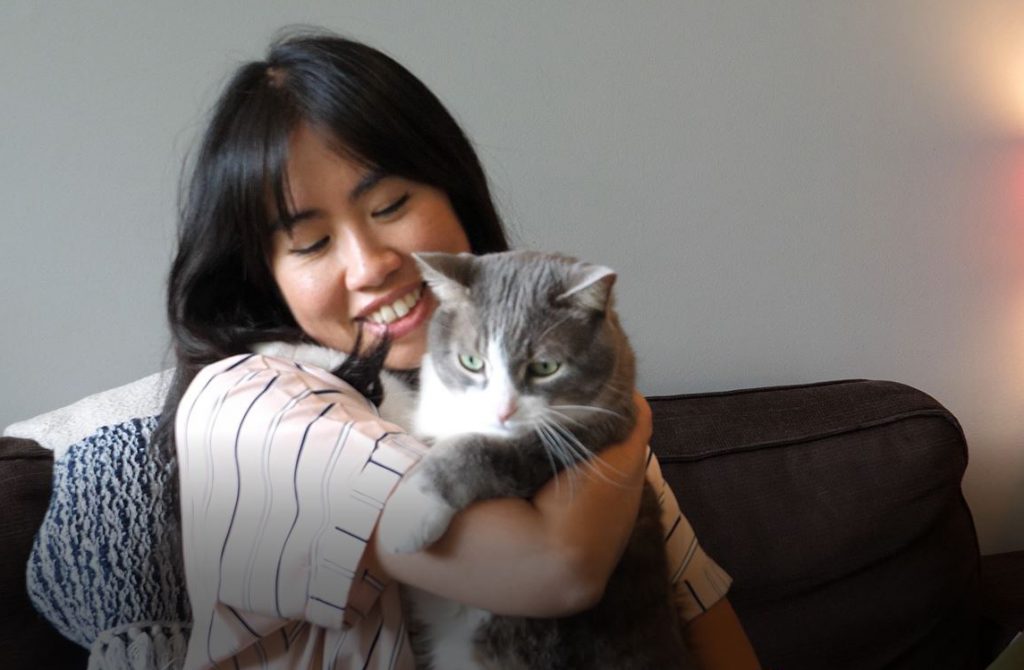
Dr. Danielle Wong and her cat Marty, who made a guest appearance in ACAM320D’s course trailer
 Faculty of Art
Faculty of Art